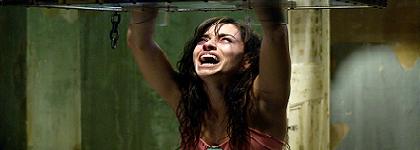Three Strikes

Saw II D
In this case, I had no one but myself to blame, and I doubt there is much need for commentary. The shocks on sale in Saw II are mostly of the "What is the world coming to?" variety, both because the grisliness of the scenario and the images is so unremitting and because it turns out that somehow, someway, cowriter-director Darren Lynn Bousman and Saw impresario Leigh Whannell watched Book of Shadows: Blair Witch 2 and, alone among the world's citizens, thought it a great flick. Saw II, proudly opting for Roman numerals, similarly throws a bunch of disposable people into a dank and creepy house and mostly disposes of them. Except for a truly stomach-turning interlude inside a vat full of hypodermics and a gleeful auto-homage to the risible "chase" scene in Saw the Elder, Saw II's putridity takes utter leave of all standing definitions of taste and coherence. The strenuous feints at moralizing—both films' conceit is that the killer is trying to make his victims kick their addictions and value their lives—is unmistakably thin and opportunistic, designed for those audiences who like to relish in sin, voyeurism, and depravity while pretending their own moral elevation. Or for viewers like me who quite insensibly toss money at ventures like this, suspecting full well what I'm asking for and getting exactly that, two- or threefold.

Jarhead C–
Jarhead, meanwhile, appropriates a perfectly viable premise and humiliates audience expectations by staunchly refusing all available avenues. Neither a film of ideas nor a howling screed nor a populist entertainment nor a beefcake calendar nor an oil-black comedy nor a coming-of-age drama nor an action thriller nor a grounded character study, Jarhead emerges only as a pure study in avoidance, bubble-wrapping the themes and emotions at its core in multiple layers of plastic vacuity. For almost an hour, the context of war is a sagging pretext for an irksomely endless series of riffs on alpha-male infantilism. As in Sam Mendes' other films, Jarhead shares the obsessions of its characters—in this case, with masturbation, with women as distant and probably faithless objects, with young men's jockish unease around each other's jockish bodies—and yet stands away from them, making stained-glass images about its themes instead of more fully credible or even audible artistic statements, to say nothing of cogent political statements.
Since American Beauty was itself about a spiritual and intellectual emptiness at the heart of cosmetic pretense, Mendes' slicksterisms worked just fine; in context, they even fascinated. Jarhead, though, verges much closer to Road to Perdition levels of total irrelevance, ultimately afraid of the last theme standing, which is the possibility that the Gulf War amounted to nothing, a stalled engine both in the global-political domain and in the minds of the soldiers who fought there. This strikes me as a uselessly glib way of conceiving world events or human character, and the film isn't serious about it anyway: Jamie Foxx, giving the most charismatic performance in a terminally underwritten part, has a late-breaking monologue about loving his job that comes from absolutely nowhere in the script except a compulsory instinct to "deepen" itself, and Jake Gyllenhaal has to mumble some last-minute tautologies about being in the desert even when he isn't, and not being there even when he was, and about being the desert, and how we are all still in the desert.
In the literal senses that this is true, Jarhead offers nothing by way of insight. In the historical sense, speaking as the son of a U.S. Army colonel who earned a master's in Middle Eastern history before commanding an artillery batallion in the first Gulf War, this is just as much an inanity. One of the earliest passages in Jarhead the book, reproduced at length here, holds that even the most artistically complex war movies, whatever their ingrained politics, are re-gristed as jingoistic, hormonal fuel for Army recruits, who watch something as jagged as Apocalypse Now and get off on the explosions and ammunitions. Mendes' response to Swofford's anecdote has been to evacuate meaning, message, and care, presuming that they will be lost or peripheral to this audience, and probably to all the audiences who stand to fill Jarhead's coffers. The film is technically proficient, at least in its cinematography, but the cynical and cowardly disservice it does to its own genre and themes eat away at everything passable in it.

Shopgirl F
I would love to report that the old adage about "three times lucky" reversed my moviegoing fortunes, but in fact things came screeching to a truly dispiriting halt with this limp noodle of a film, in which every single thing either goes wrong on its own terms or else is wholly undermined by a framework of truly idiotic page-one decisions. The biggest challenge to making a great movie of Shopgirl would be navigating the tension between the mercenary cynicism of Ray Porter (Steve Martin), who essentially rents a sales girl at Saks Fifth Avenue as a convenient accessory-receptacle whenever he's in LA, and the plangent romanticism with which Mirabelle Buttersfield (Claire Danes) misconstrues her effect on Ray, and which causes even Ray to wonder whether he's selling this relationship short. Both characters seem to have internally divided views about what they're up to, but they opt for the paths of least resistance—in his case deception, in hers self-deception, with a thick mortar of sex and materialist reward sealing it all together.
Again, not a bad premise, but director Anand Tucker and over-proud papa Steve Martin, who also wrote the book and adapted the script, deface the script's potential in truly moronic ways. Martin narrates, though the narrating voice doesn't seem to quite be Ray's, since it not only describes itself as "objective" but comments attentively on scenes and entire plotlines that Ray knows nothing about. This structural conceit therefore warps our sense both of Ray and of the narration beyond any recognition: the twee and paternalistic attitude it assumes toward Mirabelle don't match Ray's conduct at all, but nor does it seem like a credible vantage for the film itself to adopt toward her, since it never probes her life or her mind in anything like the promised depth. An elementary ingredient of Shopgirl is a scalpel-sharp demystification of Ray Porter, but the film can't commit to it, implying in such precious, fluffy ways that his is the guiding point-of-view. The ending of the movie, a veritable coloratura of these God's-eye pronouncements from Ray/Martin, is as woefully over-extended as the beginning, where Mirabelle is awkwardly courted by a dull and desperate Jason Schwartzman—stuck in the Giovanni Ribisi role of making the old guy look debonair by comparison. Meanwhile, the camera coddles, flatters, and leers at Claire Danes just as Ray does, positioning her as yet another exquisite delicacy on offer at Saks, and the movie invites all manner of projection onto her wide smiles without really putting anything behind them. Who is this girl? For one scene exactly, this lonelyheart singleton goes to lunch with a pair of inquisitive friends, and you ask, she has friends? Where on earth did they come from? Doesn't the movie kind of belabor the implication that her only companion in life is her cat? Why can't the movie make a decision about how small or not small her social circle really is?
Shots of the Space Needle, of the façade of Danes' apartment, of Martin on his private plane, and of the Los Angeles skyline repeat themselves ad nauseum, "establishing" locations and transitions that are perfectly evident and, perhaps, straining for a kind of environmental poetry that the flat, ill-lit images and the outrageously thick musical score shoot dead at every turn. Words like "Vietnam" stand in for entire, wasted characters like that of Mirabelle's father. Basic matte shots of characters dining against an evening backdrop are jaw-droppingly artificial. Martin proves time and again in close-up that he isn't the kind of actor who survives well outside of dialogue or carefully framed scenarios. Unlike, say, Bill Murray—Lost in Translation really is the imagined Holy Grail for this film's failed efforts—Martin's face gives almost nothing, and for all his handsomeness at 60, the contours of his face aren't inherently interesting at all. He can't act in silence, which this film repeatedly asks him to do. The bouts of sex that account for the lion's share of Ray's interest in Mirabelle and at least some fraction of her involvement with him are coyly elided, cementing the impression that we are never really watching the story that the film insists we are watching, and despite spending two hours with three people, we never really meet anybody. Shopgirl is a story by a man in late middle-age about a twentysomething girl that the film can't understand or even portray without the gauzy, invasive prisms of orchidaceous male fantasy. The end result can only imply more about the creators and their own dreams about this girl-figure than about the girl-figure herself, making the film both embarrassing and frustrating to behold.
Labels: Movies 2005, Stinkers

















0 Comments:
Post a Comment
<< Home